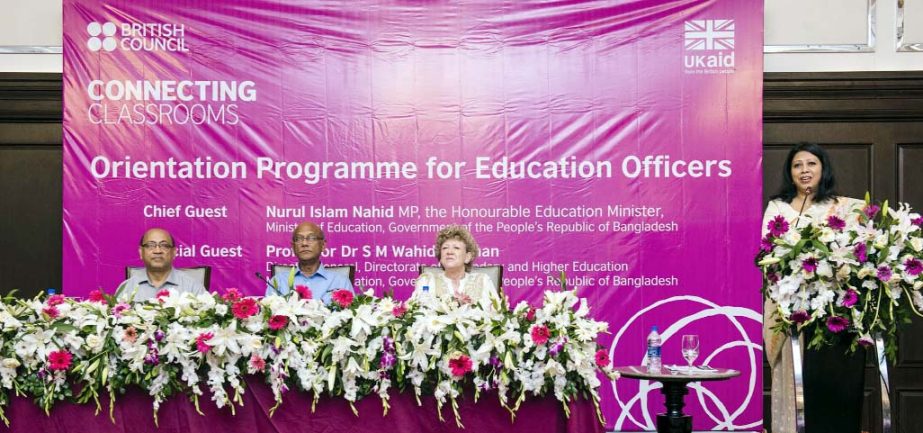
Campus Report :
The British Council organised an orientation programme for District Education Officers and Upazila Secondary Education Officers at Le Meridien Hotel in the capital recently. Education officers play a key role in executing different education policies of govt. They implement, monitor, supervise and evaluate the education policies, programmes and projects in field level. They also resolve local challenges which hinder effective implementation of any education programmes or projects by consulting with teachers and local communities and play a significant role in providing feedback from policy users to policy makers so that any shortcomings can be addressed.
Education Minister Nurul Islam Nahid MP was present at the orientation programme as the chief guest, along with Professor Dr SM Wahiduzzaman, Director General, Directorate of Secondary and Higher Education and Barbara Wickham, Director, British Council.
The British Council has been running its flagship global education programme, Connecting Classrooms, since 2009 in Bangladesh. The programme is co-funded by the Department for International Development (DFID).
The programme was aimed at building the capacity of secondary level teachers and head teachers from across the country to support them integrate a range of core skills into the curriculum. Following the success of the programme, the Directorate of Secondary and Higher Education (DSHE) and the British Council have recently signed a Memorandum of Understanding (MoU) for even more effective implementation of the Connecting Classrooms programme in Bangladesh. Nurul Islam Nahid MP said, “It is time for collaborative work. I believe Ministry of Education and the British Council jointly can make a significant impact on our education and help us to reach our education goal.”
Barbara Wickham said, “As we all are committed to ensure a vision of 21st century knowledge and skills for all students, it is critical that we support educators in mastering the required competencies that ensure positive learning outcomes for students.”
The British Council organised an orientation programme for District Education Officers and Upazila Secondary Education Officers at Le Meridien Hotel in the capital recently. Education officers play a key role in executing different education policies of govt. They implement, monitor, supervise and evaluate the education policies, programmes and projects in field level. They also resolve local challenges which hinder effective implementation of any education programmes or projects by consulting with teachers and local communities and play a significant role in providing feedback from policy users to policy makers so that any shortcomings can be addressed.
Education Minister Nurul Islam Nahid MP was present at the orientation programme as the chief guest, along with Professor Dr SM Wahiduzzaman, Director General, Directorate of Secondary and Higher Education and Barbara Wickham, Director, British Council.
The British Council has been running its flagship global education programme, Connecting Classrooms, since 2009 in Bangladesh. The programme is co-funded by the Department for International Development (DFID).
The programme was aimed at building the capacity of secondary level teachers and head teachers from across the country to support them integrate a range of core skills into the curriculum. Following the success of the programme, the Directorate of Secondary and Higher Education (DSHE) and the British Council have recently signed a Memorandum of Understanding (MoU) for even more effective implementation of the Connecting Classrooms programme in Bangladesh. Nurul Islam Nahid MP said, “It is time for collaborative work. I believe Ministry of Education and the British Council jointly can make a significant impact on our education and help us to reach our education goal.”
Barbara Wickham said, “As we all are committed to ensure a vision of 21st century knowledge and skills for all students, it is critical that we support educators in mastering the required competencies that ensure positive learning outcomes for students.”

